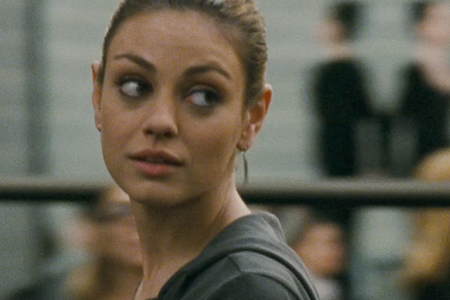17 December 2010
Who's Afraid of the Big, Bad Ballet?
After about 6 months of intense anticipation, we finally (finally!) saw Black Swan. We've been counting down the days since we first heard "Darren Aronofsky" and "Natalie Portman" spoken in the same sentence. Hearing "Mila Kunis" and "psychological thriller" was just icing on the cake. It's a story of extreme dedication, an overbearing mother, and just how far one would go to achieve perfection. Paranoia and delusions fill this film, bringing to it at times almost Hitchcock-like levels of suspense.
Natalie Portman carries this film, appearing in most, if not every, scene. It's been reported that she trained for a year to perform actual ballet in the film. That in itself is amazing, but it's the moments where she is actually happy where you feel as if the person on screen is actually feeling the emotions she is portraying, not just mimicking them. She goes through a metamorphosis over the course of her film shedding her innocence and gaining confidence.
We were disappointed that Mila Kunis isn't in the film more. She breaks through with this role, showing that she's more than just Jackie on That Seventies Show. She has a natural sense about her, displaying a realistic portrayal of her character Lily. She's the laid back foil to Portman's perfectionist Nina. Her ability as a dancer is natural and relaxed, and Nina is simultaneously drawn to her and jealous of her ability to lose herself in the dancing. Kunis deserves the nominations she seems to be racking up.
Almost it's own character in the film, the camera is always moving, at times so much that if you're prone to motion sickness it might make you dizzy. This dizziness is a proper fit with the dancing in this film. This wouldn't be a film about ballet without mirrors, and they are utilized through out. They split the characters into pieces, either in fractured mirrors, or with the caulking between two mirrors. Splitting the White Swan and the Black Swan, sanity and madness.
The performances were great, the dancing was convincing and the story was good, if at times a little flat. Throughout much of the film the audience is left wondering whether what's happening on screen is actually occurring in this world or merely in Nina's increasingly overactive imagination. This eventually begs the question, "does a ballerina really need to develop a psychological disorder in order to perform well," or is that what makes this story so interesting? Is Aronofsky giving ballet neophytes a glimpse into the art or is he telling a tragic fabrication?
The performances are what make this film one of the best of 2010. In fact it's got probably the best actual performances of any of the ones vying for awards. Aronofsky has referred to this film as a "companion" to 2008's The Wrestler and we can definitely see where he would draw similarities between the two in both content and style. Both involve athletes pushing their bodies and minds to physical limits for the sake of entertainment. In the end we highly recommend seeing this film of his. It'll be interesting to see what he does with Hugh Jackman in The Wolverine, his first foray into mega blockbuster filmmaking.
Did you like this post? Click here to follow us on Facebook!
Pin It
Subscribe to:
Post Comments (Atom)




No comments:
Post a Comment